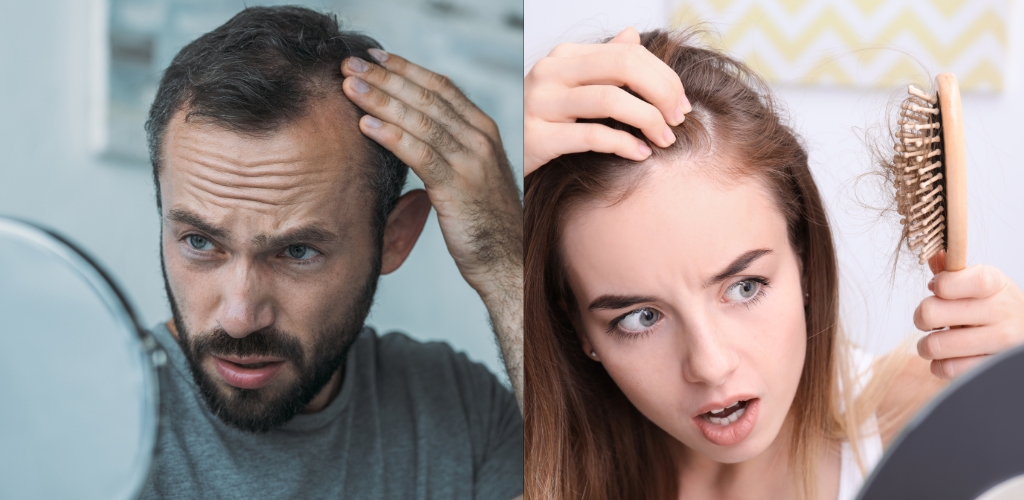Genetic hair loss, also known as androgenetic alopecia, is a common condition that affects both men and women. While the condition is largely influenced by genetics, lifestyle modifications can also play a role in managing hair loss and promoting healthy hair growth.
One of the most significant lifestyle factors that can impact hair loss is nutrition. A balanced diet rich in vitamins, minerals, and proteins can help nourish hair follicles from within, promoting healthy hair growth. Essential fatty acids, especially omega-3s, are particularly important for hair health, as they help keep the skin, hair, and nails healthy. Foods rich in omega-3s include fatty fish, flaxseed oil, flaxseeds, chia seeds, canola oil, walnuts, soybeans, tofu, and cruciferous vegetables.
Vitamins B6, B12, and folic acid are also essential for hair health. Vegetarians and vegans may be at risk for deficiencies in these vitamins, as they are primarily found in animal products. Foods rich in B6 include bananas, potatoes, and spinach, while B12 can be found in meat, poultry, fish, and dairy products. Folic acid is abundant in fresh fruits and vegetables, especially citrus fruits and tomatoes, as well as whole-grain and fortified-grain products, beans, and lentils.
Protein is also critical for maintaining healthy hair, as it helps to build and repair tissues in the body. Lean meats like fish and chicken, eggs, and soy products are good sources of protein. It is recommended to consume one serving of protein-rich foods every day.
In addition to nutrition, lifestyle modifications such as avoiding harsh styling products and heat treatments can help maintain healthy hair. Getting plenty of sleep and managing stress through meditation, yoga, and other relaxation techniques can also help manage stress-related hair loss.
While genetic factors like male or female pattern baldness can play a role in hair loss, lifestyle modifications can help manage the condition and promote healthy hair growth. By incorporating a balanced diet, avoiding harsh styling products, managing stress, and taking a daily multivitamin, individuals can take steps to maintain healthy hair and reduce the risk of hair loss.
What are some common lifestyle modifications that can help prevent genetic hair loss ?
Hair loss, or alopecia, can have various causes, including genetics, vitamin and mineral deficiencies, skin problems, poor diet, hormonal issues, and stress. While some factors, such as genetics, may be beyond our control, lifestyle modifications can play a significant role in preventing and managing hair loss.
Here are some common lifestyle modifications that can help prevent genetic hair loss:
- Balanced Diet: A balanced and regular diet is essential for healthy hair. Sudden weight loss, low-calorie diets, unbalanced diets, obesity, and excessive intake of vitamin and mineral supplements can cause hair loss. Consuming a diet rich in vitamins, minerals, and proteins can help nourish hair follicles from within, promoting healthy hair growth.
- Nutrition and Diet: The Mediterranean diet, characterised by low amounts of saturated fat, animal protein, and high amounts of unsaturated fat, fibre, polyphenols, and antioxidants, can help promote hair growth and reduce hair loss. The main nutrients found in the Mediterranean Diet are rich in antioxidant, anti-inflammatory components, making them beneficial for hair loss treatment.
- Avoiding Harsh Styling Products and Heat Treatments: Avoiding harsh styling products and heat treatments can help maintain healthy hair. Excessive use of styling products, hair dyes, and heat treatments can damage hair follicles and lead to hair loss.
- Managing Stress: While there is no direct relationship between stress and genetic hair loss, stress-related hair loss conditions can exacerbate or initiate male pattern baldness if you’re already predisposed to it. Managing stress through meditation, yoga, and other relaxation techniques can help prevent hair loss.
- Avoiding Certain Medications: Certain medications, such as anabolic steroids, can contribute to hair loss. It’s essential to avoid using anabolic steroids and certain peptides to prevent hair loss.
- Protecting Hair from Damage: Protecting hair from damage by avoiding rough handling, using gentle hair care products, and avoiding excessive exposure to the sun can help prevent hair loss.
Hair care practices that can help prevent genetic hair loss
Hair care practices play a crucial role in preventing genetic hair loss. Here are some practices that can help maintain healthy hair and potentially reduce the risk of genetic hair loss based on the provided sources:
- Balanced Diet: Consuming a balanced diet rich in vitamins, minerals, and proteins is essential for healthy hair growth. The Mediterranean diet, which includes low amounts of saturated fat, animal protein, and high amounts of unsaturated fat, fiber, polyphenols, and antioxidants, may help promote hair growth and reduce hair loss.
- Avoiding Harsh Styling: Avoiding harsh styling products and heat treatments can help maintain healthy hair. Excessive use of styling products, hair dyes, and heat treatments can damage hair follicles and lead to hair loss.
- Stress Management: Managing stress through relaxation techniques like meditation and yoga can help prevent stress-related hair loss conditions that may exacerbate genetic hair loss.
- Regular Checkups: Routine checkups with a healthcare provider can help identify underlying conditions like anemia, low vitamin D levels, or abnormal thyroid hormones that can affect hair health and potentially contribute to hair loss.
- Protecting Hair from Damage: Protecting hair from damage caused by heat styling tools like hair dryers, flat irons, and curling irons can help prevent hair loss. Minimizing heat styling can help maintain the health of hair follicles and reduce the risk of hair loss.
- Avoiding Tight Hairstyles: Black women, in particular, are prone to traction alopecia caused by tight hairstyles that pull at the hair root. To prevent traction alopecia, it’s essential to avoid tight styles like braids, dreadlocks, extensions, and weaves that can damage hair follicles.
By incorporating these hair care practices into your routine, you can help maintain healthy hair and potentially reduce the risk of genetic hair loss. It’s important to consult with a healthcare provider or dermatologist for personalised advice and treatment options tailored to your specific needs.
Conclusion :
In conclusion, while genetic factors play a significant role in hair loss, lifestyle modifications can complement treatment strategies and promote healthy hair growth. By adopting a balanced diet rich in essential nutrients, avoiding harsh styling practices, managing stress, and protecting hair from damage, individuals can support the health of their hair follicles and potentially reduce the risk of genetic hair loss. Incorporating these lifestyle changes into daily routines can contribute to overall hair health and may help mitigate the impact of genetic predispositions to hair loss conditions like androgenetic alopecia. It’s essential to consult with healthcare providers or dermatologists for personalised advice and treatment options tailored to individual needs. With proactive measures and a holistic approach to hair care, individuals can take control of their hair health and maintain vibrant, healthy-looking hair.
Citations:
[1] https://psychscenehub.com/psychinsights/pharmacogenomics-drug-prescribing-psychiatry/
[2] https://www.phntx.org/exploring-solutions-to-hair-loss/
[3] https://www.webmd.com/skin-problems-and-treatments/hair-loss/eat-right-healthy-hair
[4] https://www.dermatologytimes.com/view/androgenetic-alopecia-risk-ided-genetic-test
[5] https://www.ncbi.nlm.nih.gov/pmc/articles/PMC3107963/
[6] https://www.getmosh.com.au/blog/lifestyle-changes-you-can-make-to-avoid-hair-loss
[7] https://www.dermatologytimes.com/view/androgenetic-alopecia-risk-ided-genetic-test




